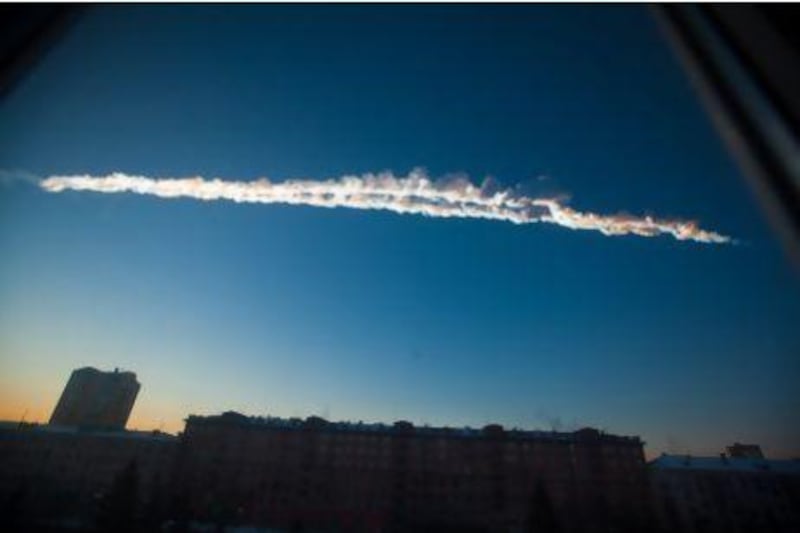MOSCOW // A meteor that streaked at supersonic speed over Russia's Ural Mountains set off blasts that injured 1,000 people, officials said on Friday.
The Russian Academy of Sciences said the meteor - estimated to be about 10 tons - entered the Earth's atmosphere over the Chelyabinsk region travelling at an estimated 54,000 kilometres per hour. It shattered about 30-50km above the ground, releasing several kilotons of energy above the Ural Mountains.
Chelyabinsk health chief Marina Moskvicheva, said that 985 people in the region had asked for medical assistance. The Interfax news agency quoted her as saying 43 were hospitalised.
Chelyabinsk regional governor Mikhail Yurevich, quoted by the RIA Novosti news agency, said two-thirds of the injuries were light wounds from glass shards and other materials blown out by the shock wave. "First I thought it was a plane falling, but there was no sound from the engine ... after a moment a powerful explosion went off," said witness Denis Laskov.
"In a lot of the houses on our street the windows were blown out," he told state television. Officials said almost 300 buildings were damaged including, schools, hospitals, a zinc factory and even an ice hockey stadium.
Amateur video broadcast on Russian television showed an object speeding across the sky just after sunrise, leaving a thick white contrail and an intense flash.
"There was panic. People had no idea what was happening. Everyone was going around to people's houses to check if they were OK," said Sergey Hametov, a resident of Chelyabinsk, about 1500 kilometres east of Moscow, the biggest city in the affected region.
"We saw a big burst of light then went outside to see what it was and we heard a really loud thundering sound," he said.Another Chelyabinsk resident, Valya Kazakov, said some elderly women in his neighbourhood started crying out that the world was ending.
Some fragments - known as meteorites - fell in a reservoir outside the town of Cherbakul, the regional governor's office said, according to the ITAR-Tass news agency.
It was not immediately clear if any people were struck by fragments.The agency also cited military spokesman Yarslavl Roshupkin as saying that a six-meter-wide crater was found in the same area which could be the result of fragments striking the ground.
No fatalities were reported, but President Vladimir Putin, who was due to host finance ministry officials from the Group of 20 nations in Moscow, told emergencies minister Vladimir Puchkov to help those affected.
"Unfortunately, the normal work of some industrial enterprises was disrupted, people have suffered as has social infrastructure - kindergartens, schools," Mr Putin said."First of all, it is necessary to think about how to help the people, and not only to think about it, but to do it immediately," he added.
A local ministry official said such incidents were extremely rare and Friday's events might have been linked to an asteroid the size of an Olympic swimming pool due to pass earth. However, the European Space Agency said its experts had confirmed there was no connection.
"There have never been any cases of meteorites breaking up at such a low level over Russia before," said Yuri Burenko, head of the Chelyabinsk branch of the emergencies ministry.
Associated Press, Reuters and Agence France-Presse






